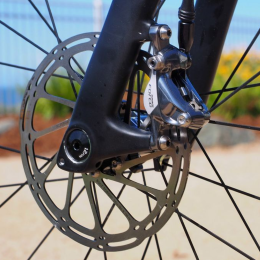Tips & Resources
Disc brakes vs rim brakes on road bikes – why the angst?
You may have noticed the prevalence of bike companies equipping more and more of their bikes with discs. Some think they are unquestionably the way of the future, while others think they are simply just another opportunity for bike companies to get more money out of you.
In this article, Glen Jenetzki, Bicycle Network’s General Manager of Commercial and avid bike rider, discusses the pros and cons of disc brakes versus rim brakes, and what you should you consider when choosing your next bike.
Background
Rim brakes have been around for more than 100 years in various forms, with some of the original designs using cork or a type of wool pad braking against lacquered wooden rims. There have been many varieties over the decades including caliper, cantilever, roller cam, etc.
There are disc brakes such as Schwinn Manta Rays and Shimano’s hydraulic version dating back to the ’70s, but they didn’t really start to gain traction until the mountain biking boom of the ’80s.
Technology is moving fast and so too is popular opinion. Some bike manufacturers have stated that they may look to cease manufacturing rim brake bikes and only produce disc brake equipped bikes moving forward, a statement that almost surely comes from consumer demand.

Making the change to disc
So when it comes to making your next bike purchase, what are the things to consider?
It should be noted that for the sake of this article I’m mostly referring to hydraulic disc version as opposed to mechanical disc.
Pros
Modulation / stopping power
The undeniable truth is that disc brakes allow you to stop over a shorter distance with more control.
Wet weather stopping
Wet brake rims (especially carbon) and brake pads aren’t a great mix. Even with the best weather radar apps and planning, eventually you will be caught out in the rain. Hopefully its not when your heading down a hill. Yes, they probably will squeal but as long as they stop.
Rim wear
Inevitably rim brakes wear into the brake track on your rim, this reduces the stopping power and the life of the actual rim. Aluminum wheels are quite resilient but non the less they wear. Carbon rim wheels and the breaking heat generated wear down even quicker. Disc brakes remove all of that heat and friction wear from the rim and place it all on the disc rotor, a piece that can be easily replaced at a fraction of the cost of a complete wheel.
Tyre volume
Caliper brakes are essentially limited somewhere in the 28mm tyre size realm. Disc brake equipped bikes don’t have this limitation, allowing frame manufacturers to design and produce bikes capable of fitting much greater tyre sizes. This can significantly increase traction/grip and also means added comfort from the increased volume.
Cons
Maintenance
Most people won’t feel comfortable changing disc brake pads and the possibility of having to bleed a hydraulic disc brake system, and will need maintenance assistance. Rim brakes are relatively simple to swap over brake pads yourself without complicated tools etc.
Cost
Whether you are replacing individual components, full groupsets or complete bikes, the disc brake version is almost always more expensive. Although there is likely there is likely to be less disparity as tech improves and disc brakes become more common.
Weight
When comparing the different frame and fork construction methods, the weight difference can be anywhere between 300g to 500g. Though disc technology is advancing rapidly, it is still slightly heavier when looking at the complete system.
Danger rumours
For years there has been a perceived risks of the rotor being dangerous in a crash. This was possibly true on the original styles of rotors, but technology is moving fast and edges are now much more smooth and rounded – as shown in this short video.
The verdict
As for my two cents, I made the jump about 4 years ago and absolutely love it. Whilst I will definitely never be compared to Nibali or Bonifazio descending the Cipressa, it has definitely improved my confidence and handling on descents.
I also enjoy riding enough to know I will get caught out in the rain quite a bit. As for the downside of weight, well let’s be honest, there’s other areas I can lose that weight, I didn’t really need that second jam donut did I? So for me disc brakes win.
At the end of the day, there’s room for both on the roads and people should feel confident choosing what works best for them after weighing up the pros and cons mentioned above – and just enjoy the ride!
Become our friend
Find out more about Bicycle Network and support us in making it easier for people to ride bikes.

